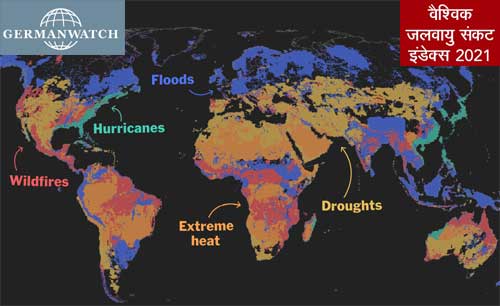Global Climate Risk Index 2021: Daily Current Affairs

- Recently, the Global Climate Risk Index 2021 was released.
- The 2021 edition of the index is the 16th annual edition of the analysis. In the CRI 2021, data from 180 countries were analyzed.
- Within this index, India has been ranked among the worst-hit countries by climate change.
- The Global climate risk index (GCRI) is annually published by Germanwatch.
- It analyses to what extent countries have been affected by the impacts of weather-related loss that includes storms, floods, and heatwaves, etc.
- For preparing the index of 2021, the most recent data available for 2019 as well as data from the year 2000 to 2019 were taken into account.
- This index is prepared based on the basis of one of the most reliable data sets available on the impacts of extreme weather events and associated socio-economic data, the MunichRe NatCatSERVICE.
- According to the report, countries that were worst affected by the impacts of extreme weather events in 2019 were Mozambique, Zimbabwe, and the Bahamas.
- It was followed by Japan, Malawi, and the Islamic Republic of Afghanistan.
- Between 2000 and 2019, Puerto Rico, Myanmar and Haiti were the countries most affected by the impacts of extreme weather events.
- According to the report, between the year 2000 and 2019 – 4, 75,000 people were affected by more than 11000 climate change conditions.
- In this index, India was placed in the 7th spot with a risk index score of 16.67.
- As per the report, India was affected by the yearly monsoon season, which typically lasts from June to early September.
- In 2019, the monsoon conditions continued for a month longer than usual, with the surplus of rain causing major hardship.
- From June to the end of September 2019, 110% of the normal rainfall occurred, the most since 1994.
- The floods caused by the heavy rains were responsible for 1 800 deaths across 14 states and led to the displacement of 1.8 million people.
- Overall, 11.8 million people were affected by the intense monsoon season with the economic damage estimated to be US$ 10 billion.48 Furthermore, with a total of eight tropical cyclones, the year 2019 was one of the most active Northern Indian Ocean cyclone seasons on record.
- Six of the eight cyclones intensified to become “very severe”.
- The worst was Cyclone Fani in May 2019, which affected a total of 28 million people, killing nearly 90 people in India and Bangladesh and causing economic losses of US$ 8.1 billion.
- Developing countries are particularly affected by the impacts of climate change.
- They are hit hardest as they are more vulnerable to the damaging effects of a hazard but have a lower coping capacity.
- Eight out of the ten countries most affected by the quantified impacts of extreme weather events in 2019 belong to the low- to lower-middle income category.
- If we are concerned about future climate change, the climate risk index may serve as a red flag for the existing vulnerability that could increase in regions where extreme events will become more frequent or severe because of climate change.
- This index is released by Germanwatch, a non-governmental & non-profit organization which is based in Bonn, Germany.
- It was founded in 1991.
- It was established with the objective to influence public policy on the environment.